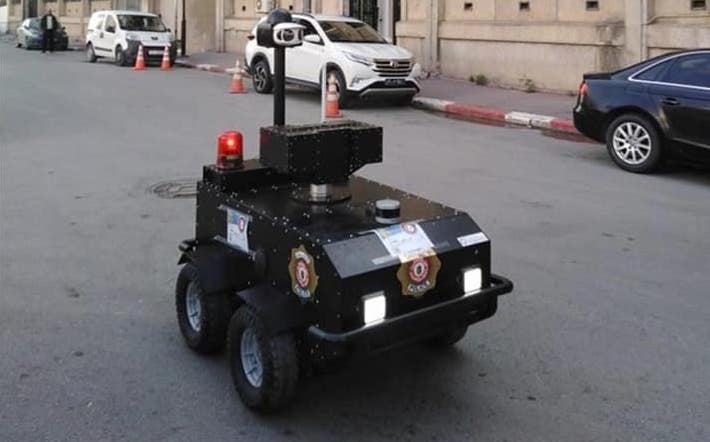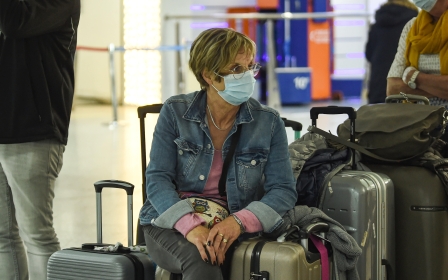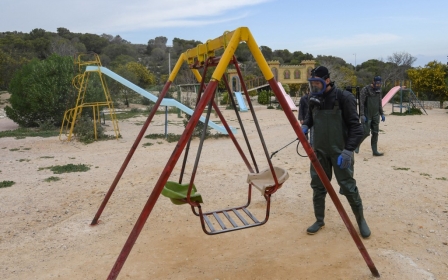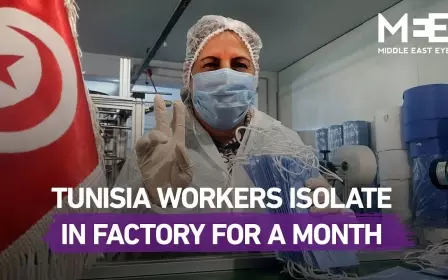Coronavirus: Tunisia deploys robots to enforce lockdown

Authorities in Tunisia have deployed robots to enforce the country's lockdown and help prevent the spread of the coronavirus.
In a series of videos that have been widely shared on social media, Tunisians have been approached by remote-controlled vehicles asking if they're aware of lockdown rules.
According to one of the videos, which is akin to a scene from a sci-fi movie, a man is confronted by one of the robots as he steps onto an empty street in the capital Tunis.
The robot castigates the man, asking: "Are you aware of the lockdown?" and demands to know where he is going.
After he explains that he is going to buy cigarettes, the robot tells him to "go get your smokes and go home. Hurry up!"
New MEE newsletter: Jerusalem Dispatch
Sign up to get the latest insights and analysis on Israel-Palestine, alongside Turkey Unpacked and other MEE newsletters
In another video, a woman is told: "Everyone is required to apply public quarantine procedures and not to leave their homes to limit the spread of the contagion."
According to its manufacturers, the P-Guard robots are manned remotely and use several infrared cameras, a laser telemetry system and thermal cameras.
According to local media, they have been used across the capital by the Ministry of Interior after a lockdown came into effect on 22 March.
The Tunisian government has implemented a series of policies in order to help stop the spread of the coronavirus, officially known as Covid-19.
The North African country shut schools, universities, cafes and bars; closed its land and maritime borders and suspended all international flights.
The presidency has also announced increased military deployments to enforce the restrictions.
Factory workers self-isolate to produce protective masks
Last week, around 150 people decided to self-isolate at a Tunisian factory that makes masks and other medical equipment, in order to help the fight against the spread of the disease.
Staff at the Consomed factory said they felt the need to self-isolate in case the virus spread among workers. If employees fell ill, the factory would not be able to keep up with the demand for protective equipment from the local healthcare sector, plant manager Hamza Alouini said.
'My husband and my daughter are the first to support me. We are all motivated'
- Khawla Rebhi, factory worker
"We are the only ones producing (protective items) for Tunisian hospitals.
"I chose to isolate (the company) as a precaution because if the virus gets into the factory, it will be disastrous," he added.
Khawla Rebhi, who is in charge of the production line, said the workers were motivated by patriotism to go into 30-day isolation.
"My husband and my daughter are the first to support me. We are all motivated," said Rebhi.
"We are all colleagues and we help each other. When a person feels stressed we try to cheer them up, change their mood. Because there are some who miss their family."
Last week, Tunisia allocated $850m to combat the economic and social effects of the crisis.
The country expects the virus to damage its tourism sector, which accounts for about 10 percent of gross domestic product, and has also anticipated an economic recession, prompting the government to reduce its growth forecast this year to 1 percent from 2.7 percent.
This article is available in French on Middle East Eye French edition.
Middle East Eye delivers independent and unrivalled coverage and analysis of the Middle East, North Africa and beyond. To learn more about republishing this content and the associated fees, please fill out this form. More about MEE can be found here.




